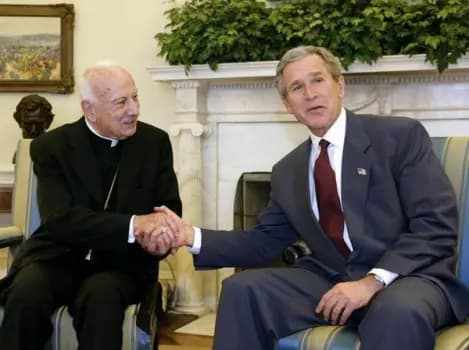ROME – Though all analogies are inexact, it’s nevertheless tempting to say that with regard to Cardinal Matteo Zuppi’s meeting today with U.S. President Joe Biden regarding a war, we’ve been down this road before.
The question is whether this journey will end the same way, or whether another outcome is possible.
Twenty years ago, a pope faced a major international crisis threatening wider global conflict. He dispatched a trusted Italian cardinal as a special envoy to the White House, where he was swiftly received by a U.S. president perceived to be deeply favorable to the pope and his Vatican team. Bush was such an admirer of John Paul II, in fact, that he would present the Polish pope with the Medal of Freedom, the highest civilian award bestowed by the United States.
In the end, however, the U.S. president disregarded the pope’s advice, with all the tragic consequences the Vatican had anticipated at the time.
In that case, the pope was John Paul II, the president was George W. Bush, the cardinal was Pio Laghi, and the crisis was the looming war in Iraq. The meeting took place on March 5, 2003, which happened to be Ash Wednesday, and which John Paul II had designated as a special day of prayer and fasting on behalf of peace.
Despite Laghi’s best efforts, the war began two weeks later, on March 19, 2003. John Paul had also sent French Cardinal Roger Etchegaray a month earlier to meet Saddam Hussein, who came back saying he was convinced that Hussein “wants to avoid war.”
At the time, John Paul II and his Vatican team warned that a U.S.-led invasion would not only destabilize Iraq, with especially negative consequences for the country’s small but significant Christian minority, but it could also trigger wider regional conflicts, deepen tensions between the West and the Islamic world, and set a precedent for other unilateral uses of force not authorized by the United Nations under international law.
Two decades later, it seems clear that history has delivered grim confirmation of that forecast. The aftermath continues to play out in real time.
It was just this past Saturday, for example, that Iraq’s beleaguered Christian community received its latest blow, as Patriarch Raphael Sako announced he would abandon his headquarters in Baghdad for a monastery in Kurdistan after Iraqi President Abdul Rashid revoked a decree recognizing Sako as head of the Chaldean Catholic Church, in what Sako has described as a bid to assert control over the church’s administration and assets.
In broader terms, one could argue that Russia’s unilateral invasion of Ukraine amounts to another illustration of the point made in 2003 by the Vatican’s then-foreign minister, French Cardinal Jean-Louis Tauran, that when powerful states launch wars without an international legal warrant, it amounts to a victory of “the law of force over the force of law.”
It remains to be seen whether Zuppi will have any greater luck in persuading the Biden administration to change course on Ukraine.
Of course, there are several notable differences between Laghi’s mission twenty years ago and Zuppi’s today.
For one thing, Laghi’s mission came before the war had broken out, so his appeal boiled down to a binary choice: Yes or no to the use of force. In Zuppi’s case, the war has been underway for almost a year and a half, and the U.S. is not technically among the belligerents. As a result, he’s not posing a simple yes/no choice to the Biden administration, but rather exploring a wider, and thus murkier, set of options.
Indeed, most signals are that Zuppi isn’t coming to deliver any ultimatum on behalf of the pope, but rather to explore possible humanitarian initiatives, such as the restitution of Ukrainian children removed from the eastern part of the country by Russian forces.
For another contrast, in the case of Iraq in 2003, the Vatican’s appeal for restraint came with the support of many of the U.S.’s traditional European allies. On Ukraine, the Western powers so far have been remarkably compact in their opposition to the Russian offensive.
In addition, Laghi, who had served as the papal ambassador to the United States under both Ronald Reagan and Bush’s father, was dispatched on a one-off mission to deliver a message from John Paul to the White House. Zuppi arrives in Washington as part of a wider listening tour that’s already taken him to Kyiv and Moscow, and which may yet also lead him to Beijing.
Whether those differences in form will also lead to a different outcome remains to be seen.
If anyone on the American side ought to be positioned to learn the lessons of history in terms of ignoring papal warnings about a war, it should be Biden. He was chair of the Senate Foreign Relations Committee in the run-up to the invasion of Iraq, and was well aware of John Paul II’s moral opposition to the looming conflict.
Biden voted in 2002 to give Bush authorization to use military force in Iraq, and later would describe that decision as a serious mistake – in effect acknowledging that, at least in that case, the Vatican was right and the White House was wrong.
Biden will meet Zuppi today in the wake of another choice which the Vatican clearly deplores, which is to give cluster munitions to Ukraine. In general, despite the limited humanitarian focus of Zuppi’s immediate goals, the end-game is to open channels of dialogue that might lead to a cease-fire and a negotiated settlement.
One wonders if the memory of that earlier papal mission twenty years ago will strike a chord in the country’s second Roman Catholic Command-in-Chief today, producing some movement, however slight, toward a different result.
Follow John L. Allen Jr. on Twitter: @JohnLAllenJr













